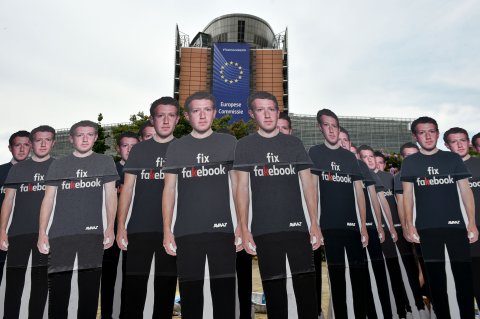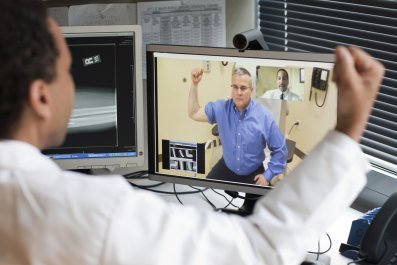Listening to Jimmy Wales speak is a bit like reading a Wikipedia page: Sound bites are few, but the tone is fair and measured.
That's one reason people tend to listen to him; another is that Wales is one of Silicon Valley's most successful internet entrepreneurs. Wikipedia, his brainchild, attracts 1.2 billion page views per month by one ranking, second only to Google's YouTube.
Now Wales is sounding the alarm about social media. The problem, he says, is that Facebook makes most of its money selling advertising targeted to users according to information gleaned from their behavior on Facebook—a practice that Harvard's Shoshana Zuboff calls "surveillance capitalism." In recent years, Facebook has been using artificial intelligence to make inferences about users, the better to keep them engaged with the site—or, as some critics assert, addicted to it. Critics also say the focus on engagement accounts for a proliferation of extremism on Facebook and other social media, which contributes to a polarized political atmosphere that is eroding the nation's democratic institutions.
Wales' response to this trend is to start a non-profit alternative to Facebook. In October, he launched WT Social, a site that contains no advertisements and vows not to sell user data. In its first month, WT Social attracted 200,000 users, the company claims.
Wales carries some moral authority. Compared to Facebook's Mark Zuckerberg, who is reportedly worth more than $70 billion from the success of the social media giant, Wales is a pauper (though he insists "I'm doing fine"). His interest, he says, is to "make sure that we keep a free and open internet, that user rights to do things online are respected."
Wales spoke on the phone recently with Newsweek about the new venture and where social media is headed. Here are edited excerpts.
Why did you start an alternative to Facebook?
I've been thinking about the problems around the quality of information that's being distributed online for a couple of years now and came to understand that it's not just a problem of sources. It's also a problem of the algorithms that are sending people low quality information designed primarily around engagement—keeping people clicking. It's a direct result of the advertising-only business model of the social networks. The only real incentive they have is to try to show you as many ads as possible. And it turns out that through machine-learning and AI, they've designed very addictive machines to keep people clicking, which isn't necessarily consistent with what we want or need.

Has AI and machine learning technology changed social media in recent years?
I think so. There isn't anything inherently wrong with machine learning and AI, but when you apply that technology to the task of showing people as many ads as possible, then there are side effects. And that's where I see the problem.
What do you hope to accomplish with WT Social?
First and foremost, I hope I built something that I enjoy, because I'm fed up with low quality social media. I'm concerned about the state of the world. If we can build something so that people who are interested in quality can come and find like-minded people and share quality content and changes the dynamics in the world, that'll be amazing.
What do you need to do to bring about that change—are there a certain number of users or type of users?
I'm just doing something I think is cool and I hope people like it.
Is Wikipedia, with volunteer funding, financially stable?
We bring in a little more money every year than we spend, so we're good on that front. But what's been happening in the last 10 or 15 years across journalism has had a subtle impact. The destruction of small town, local newspapers means that not a lot of the "first draft of history" is being written. For example, if you want to write the history of my hometown—Huntsville, Alabama—you'll probably have an easier time writing the history back in the late seventies or early eighties than you would today, because the local newspaper has gone from seven days a week to three days a week. When we look back on this era, when people are writing history in 15 or 20 years, they're going to say, "Jeez, we actually have no idea what went on in small towns." Because there's so little reporting going on. That's a huge problem that we need to solve in society.
Are Facebook and Google to blame for taking advertising business from newspapers?
It's complicated. There are many different factors. Let's step away from journalism and talk about YouTube. People have shown that if you take a completely clean, brand-new computer and go to YouTube and you start watching innocent videos, before long you end up watching conspiracy-theory extremists. No one at Google, I'm quite certain, thought, "Let's design a system that will lead people into conspiracy thinking." I don't think anybody at Facebook or Google thought, "Okay, let's destroy the local news." It's a side effect. But we need to fix it.
What should that fix be?
The first step is to design systems where quality matters, where we identify the best people in the community and give them additional power to find and distribute quality information. This is why with WT social, we are launching with no ads. I believe very firmly that business models drive what any organization does. When we have pure advertising news, it's hard to resist the idea of doing clickbait—low quality stuff because it's cheap to produce and it actually works. When readers pay, you've got a completely different set of incentives. Why would people bother paying unless you're providing something unique and different that they find meaningful? Not using advertising as a business model poses challenges. If it's a social network, it doesn't make sense to charge everyone. But we know, from Wikipedia, that's it's possible to say, "you don't have to pay, but this deserves to live, so maybe you should pay." That's my approach.
Elizabeth Warren talks about breaking up Facebook and Google. Do you think that's a good idea?
I'm reluctant to endorse anything on that front. These are big and complicated topics and I don't think it's simple. Facebook is a social network—people have friends all over the world—so you're not going to break it into mini-Facebooks. But taking a look at anti-competitive behavior and broader policy around making sure that entrepreneurship still matters and that people can come up and compete and so forth is really important.

You're talking about government regulation, and yet you've been critical of Europe's privacy laws.
In Europe, there's been a lot of bad legislation proposed. For example, mandatory upload filters which was a proposal in European parliament, would have required websites to check every single thing that gets uploaded against a database of copyrighted works and block the upload if there was a match. It is a disastrously stupid idea: It treats everybody like a criminal and ignores all the nuances of fair use. So it was defeated. We want the internet to be a place where people can go and post things. We don't want everything to be top down and controlled like broadcast media. Like we want that rich diversity on the internet.
Is Silicon Valley greedy?
That's actually a very interesting question. In some cases, yes, of course, there's no question about that. But in other cases, people have made an awful lot of money—like, stunning, shocking amounts of money—while not being especially motivated by money as such. Which is an interesting phenomenon. I wouldn't paint Mark Zuckerberg as an aesthetic who doesn't care anything about money. But I don't think he was ever driven purely in a money direction.
What do you spend most of your time doing these days?
In the last few months I spend most of my time working on WT Social. We've got three developers and one community manager. I'm basically just designing and building with my team and I'm having fun. So that's what I spend a lot of time doing. But I also spend time traveling and speaking, and doing missions for Wikipedia and meeting people, and doing that sort of thing.
Where do you think machine learning is taking us?
It's a very powerful tool and therefore it has some really amazing positive implications for us. For example, driverless cars technology is proceeding faster than most people realize. It has the opportunity to completely transform the safety of driving. It's coming, and it's going to be amazing. In medicine, the use of big data to build all kinds of analyses of healthy behaviors or genome sequencing, or drug development and so on. These are going to be really remarkable and are going to do amazing things for length and quality of life for many, many people all around the world. You've seen some interesting examples already of machine learning being able to improve the ability to predict a heart attack so that the right people are getting the right treatment. It's saving lives and that's fantastic.
So, what could go wrong?
On the other side of the coin, we can say the same fundamental set of technology can be used to do incredibly powerful micro targeting of political advertising, which has huge negative implications. Politicians are able to segment, so that I'm seeing a completely different message from what you are seeing. You wouldn't have been able to do that without some serious technological horsepower. It's not a job that humans can do, but you can do it at scale with machine learning. With Brexit, ads were targeted to different people and they were contradictory. Wow, that's really terrible. Politicians should not do that. We need to think about what that means and how we stop it.
You are, famously, not a billionaire. Does that bother you?
No, it doesn't. I have a fascinating and interesting life. I travel the world, I see whoever I want to see, and I know lots of interesting people. I have a lovely house. For me, it's fine.
You may be the most successful Silicon Valley entrepreneur who has operated without a profit motive.
Wikia Fandom, my for-profit company, has done very well. I don't think there's anything inherently wrong with saying, I want to start a business that brings in more than it spends, that's fantastic and that's successful. But it is true that I'm actually not obsessed with money and I don't care that much. For me, it's always more about, can I do something interesting? Fandom, which has recently been renamed from Wikia, which it was for many years after I founded it, has done very well. We have 200,000 Wiki communities that are advertising supported. We were over 200 million monthly visitors and growing. We got a big investment from TPG [a private investment firm] last year. So, that's all going very well.













